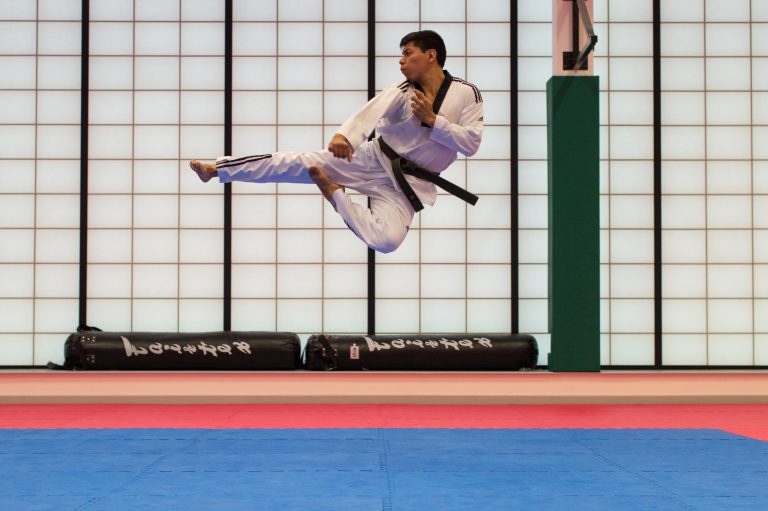The Benefits and Challenges of Training in Karate for Beginners
Karate is a Martial Art that focuses on unarmed self-defense, primarily using punches, kicks, and blocks. It’s a popular sport that is known for its combat training, but it’s also a great way to get in shape and to learn discipline. However, for beginners, there can be a few unique challenges that make understanding Karate difficult. This article will explore the benefits and challenges of training in Karate for beginners and provide insight on what to expect.
The Benefits of Training in Karate
Karate is a holistic practice since it focuses on mind and body development. Whether you’re looking to improve your physical fitness level, learn self-defense techniques, or create discipline in your life, karate has a variety of benefits.
Physical Fitness
One of the primary benefits of training in Karate is physical fitness. Karate moves are designed to be repetitive and require a high level of strength and endurance. As you practice karate more often and increase your skill level, you’ll find that your body becomes more toned and you’ll have greater strength, balance, and agility.
Health Benefits
Beyond physical fitness, karate also offers health benefits in the form of flexibility and balance. Regular karate practice helps develop your body’s natural reflexes, helping reduce your risk of injury. It can also help reduce stress and anxiety levels due to its mental challenge, focus on mental relaxation and breathing, and overall mindfulness of your body.
Self-Defense & Confidence
Karate is originally designed as a form of self-defense; As beginners learn the basic moves and forms, they build up their confidence to defend themselves if a situation calls for it. In addition to learning defense techniques, karate also helps build self-confidence by using discipline and focus to reach goals.
Challenges for Beginners
Although Karate offers many benefits to help you improve both physically and mentally, it also has a few unique challenges for beginners.
Time Commitment
Karate takes a great deal of time and dedication to master the different forms and become proficient in the techniques. Many Karate studios offer packages that range from one class a week to more advanced plans with several classes per week. For best results, beginners should attend regular classes at least twice per week.
Limited Movement & Agility
When starting Karate classes, many beginners find that they have limited range of motions due to age or other physical constraints, such as an injury or disability. This can make it difficult to execute the required steps to perform each technique correctly and with precision.
Mastering the Techniques
Karate requires mastering over 20 fundamental techniques — involving punches, blocks, and kicks — that must be done in combination with each other for success in combat. Moreover, the techniques must be executed correctly and with precision in order to be effective in self-defense scenarios. For beginners, this can require a long time to build up enough muscle memory to become proficient with all the movements.
Karate as a Leverage Point
There are many great benefits to taking up Karate for beginners if they take the time to put in the effort necessary for success. With its focus on physical training, mental discipline, and self-defense, Karate can provide leverage points for individuals looking to develop their overall well-being. Beginners need to take into account the time commitment and the physical & mental limitations they may face while learning the techniques. When done properly with consistency and dedication, many individuals find that their karate journey provides them with far more than just self-defense skills.
The Benefits and Challenges of Training in Karate for Beginners
Karate is a martial art that originated in Okinawa, Japan. Karate is a highly disciplined form of physical and mental training that is widely considered as one of the most effective martial arts for self-defense. For beginners, learning karate can be a challenging but highly rewarding experience. In this blog post, we have compiled a list of frequently asked questions about the benefits and challenges of training in karate for beginners.
1. What are the Benefits of Training in Karate?
Karate offers a broad range of benefits, both physical and mental. Here are some of the most significant benefits of training in karate for beginners:
a. Physical Benefits
1. Strength and Endurance: Karate involves a range of physical movements that improve strength, flexibility, and endurance. The harder you train, the stronger and more powerful you become.
2. Weight Loss: Karate is a great way to lose weight and burn off excess calories. The movements involved in karate training are highly effective at burning fat and building lean muscle.
3. Improved Balance and Coordination: Karate is an excellent way to improve balance and coordination, which can help protect against falls and injuries in daily life.
b. Mental Benefits
1. Increased Self-Confidence: Learning and mastering new karate techniques can enhance your self-confidence and self-esteem.
2. Reduced Stress and Anxiety: Karate promotes mental focus, which helps to alleviate stress and anxiety. You learn to center your attention, quiet your mind, and stay focused on the task at hand.
3. Greater Self-Discipline: Karate requires a high level of self-discipline, which can help you to develop positive habits, achieve personal goals, and improve your overall quality of life.
2. What are the Challenges of Training in Karate?
As with any new skill, learning karate can be challenging. Here are some common challenges that beginners may encounter:
a. Physical Challenges
1. Fatigue and Soreness: When starting karate, beginners may feel fatigued or experience sore muscles. This is normal and can be overcome with time, patience, and persistence.
2. Injury Patches: Karate involves highly physical movements, which can lead to bumps, scrapes, and bruises, especially for beginners. With proper technique and training, however, these injuries can be minimized.
b. Mental Challenges
1. Frustration and Impatience: Karate requires a lot of practice and repetition, which can be frustrating for some beginners who want to see fast results. Learning to persevere through these challenges is an essential part of becoming a skilled karate practitioner.
2. Overcoming Fear: Karate training can be frightening for beginners, especially when sparring with other students or instructors. As you progress through your training, you will learn to overcome your fears and develop inner courage.
3. Can Karate Help with Self-Defense?
Yes, karate is an effective form of self-defense. The techniques and movements learned in karate training can help you to defend yourself against attackers in the real world. Karate teaches you how to block, punch, kick, elbow and knee strike an opponent, as well as how to respond to dangerous situations.
4. How Often Should Beginners Train in Karate?
Beginners should aim to train in karate at least two to three times per week. Regular training is essential to master the techniques and movements involved in karate. Consistent practice also helps to build strength, endurance, and flexibility.
5. What Equipment is Required for Karate Training?
To start your karate training, you will need the following equipment:
1. Karate Uniform: Also known as a gi, a karate uniform is a white or black jacket and pants.
2. Belt: The color of the belt signifies the level of skill and experience of the student.
3. Protective Gear: Depending on the type of training, you may need protective gear such as gloves, headgear, and shin guards.
Conclusion
Karate is a highly disciplined and effective martial art that offers a range of physical and mental benefits. While karate training can be challenging for beginners, the rewards of mastering the techniques and movements are well worth the effort. If you are a beginner interested in learning karate, find a reputable instructor and start training today!
Inhaltsverzeichnis






